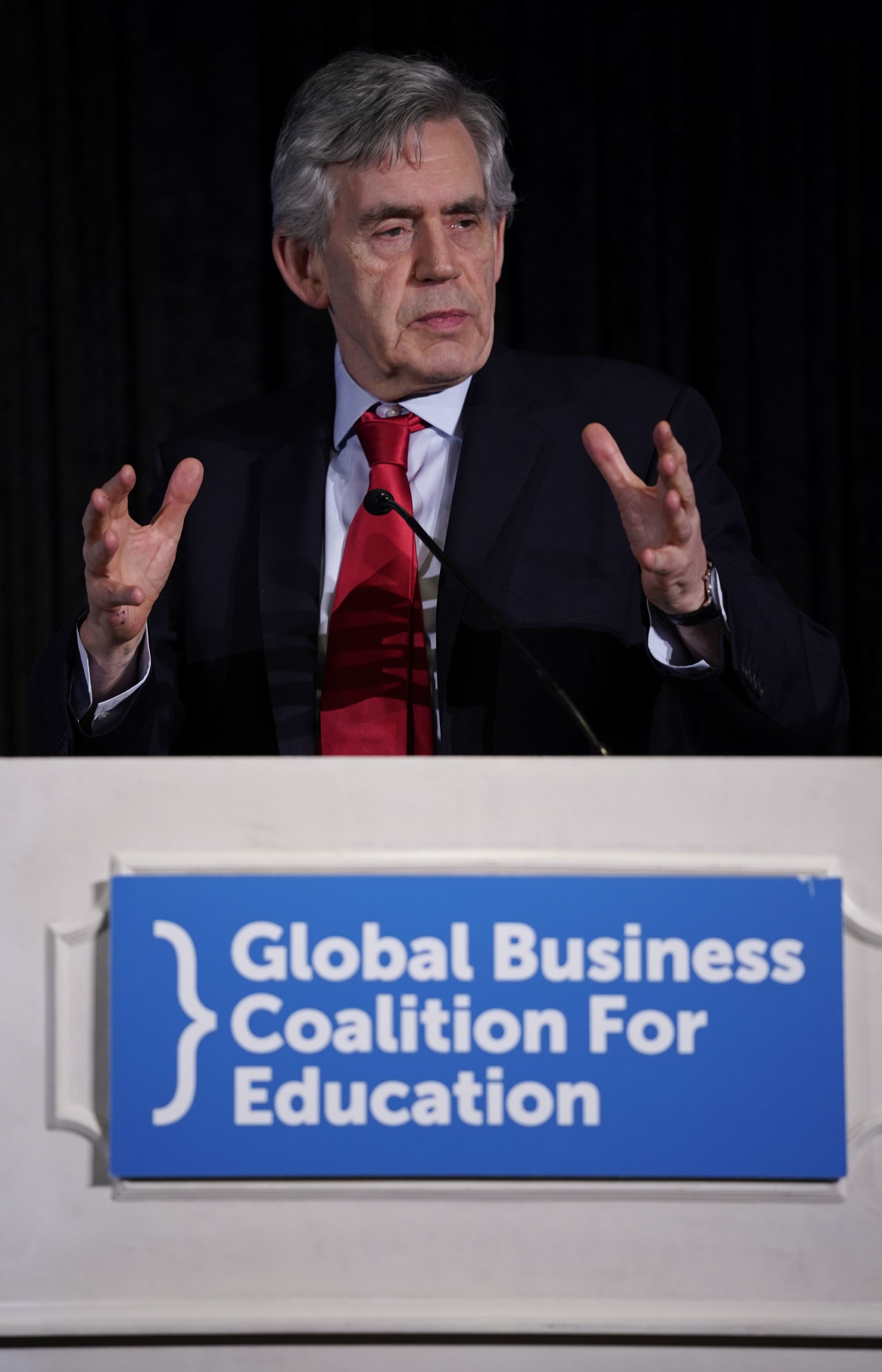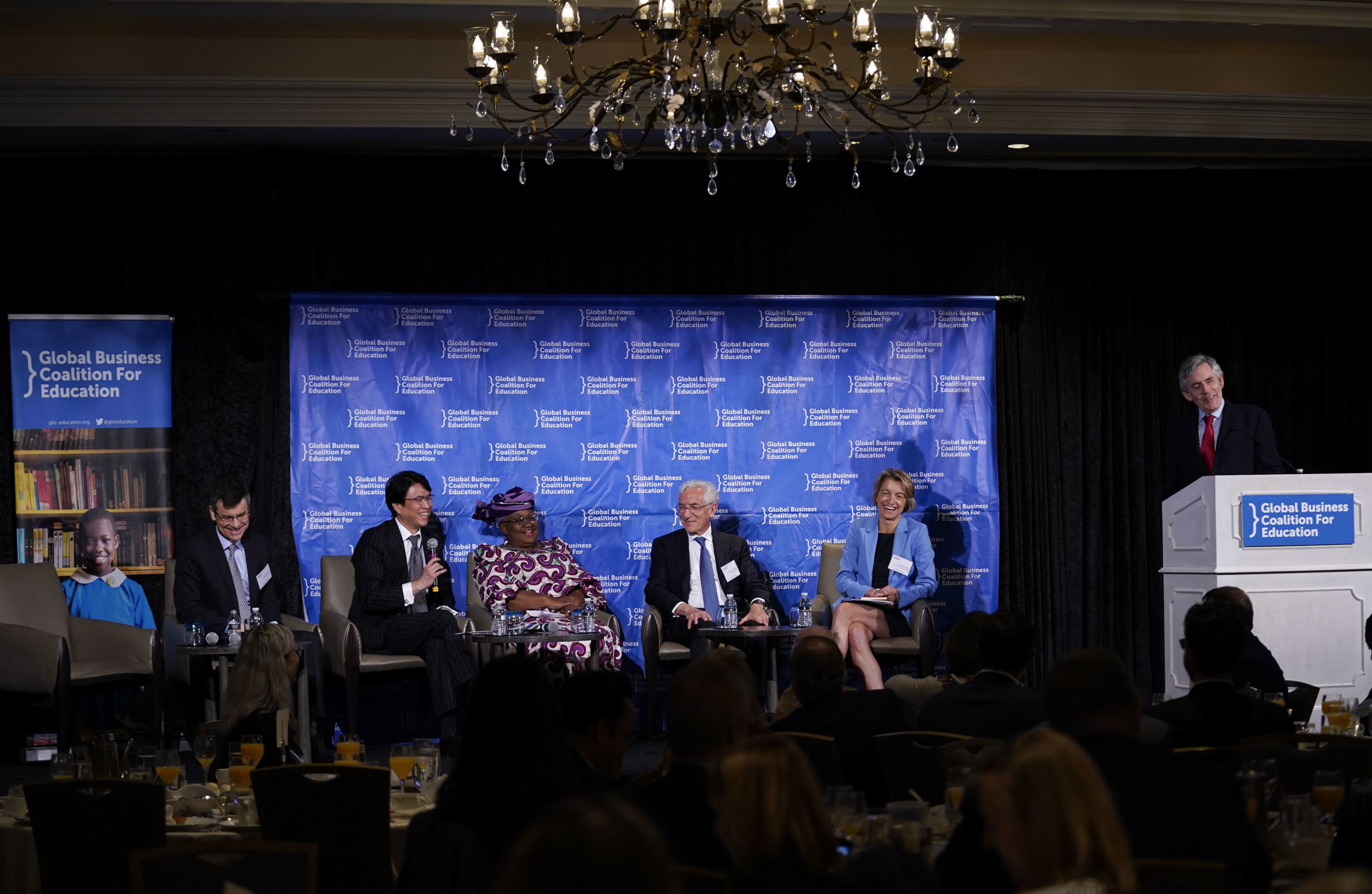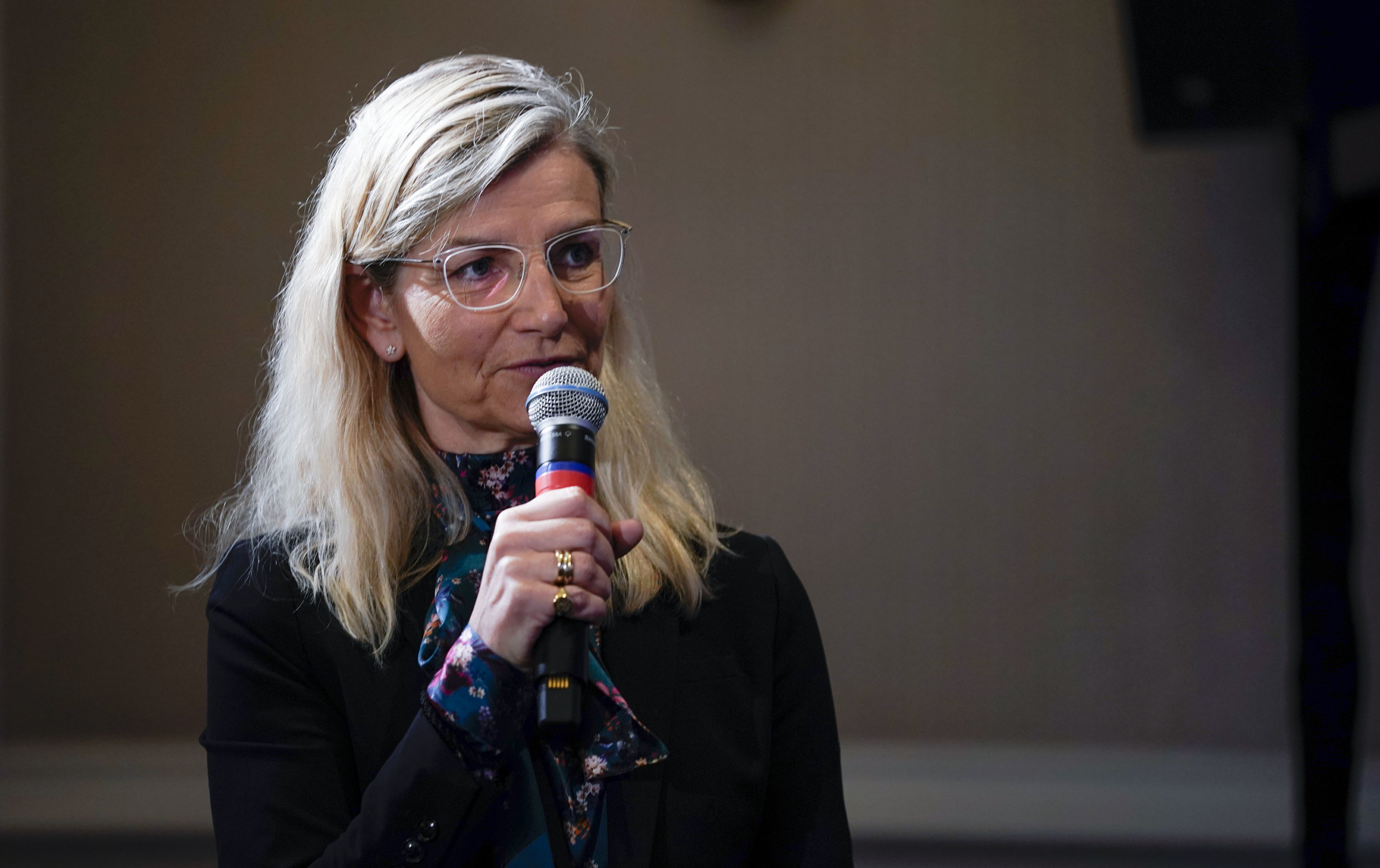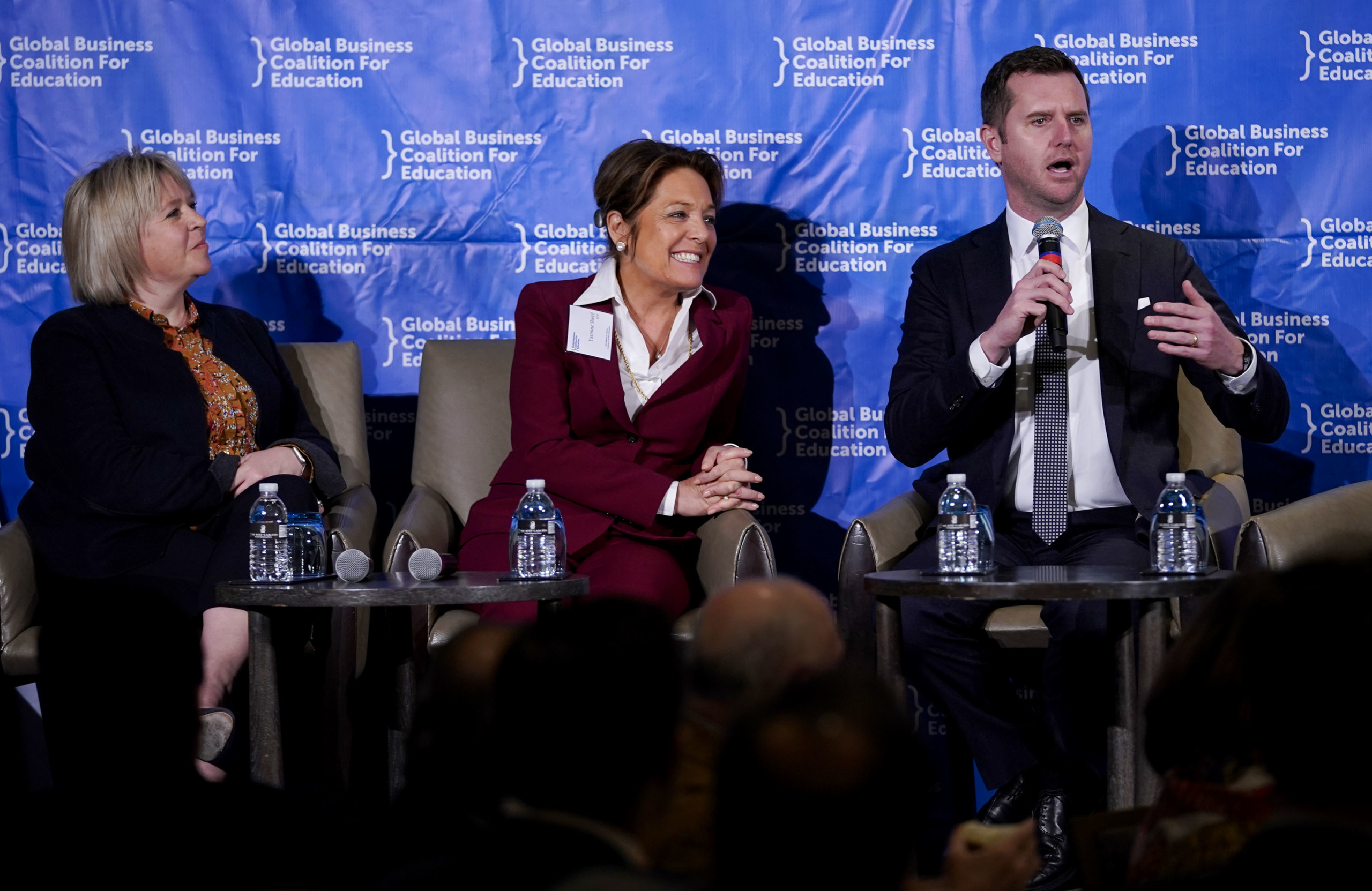From Billions to Trillions: Investing in the Next Generation
About the event
Monday, April 15, 2019
Executive Director Justin van Fleet discussing the need for greater funding for SDG 4. Photo credit: Leigh Vogel/Global Business Coalition for Education
Last Thursday, the Global Business Coalition for Education (GBC-Education) hosted a high-level breakfast event, From Billions to Trillions: Investing in the Next Generation, featuring important voices from business, government, foundations, and civil society in a conversation around innovative education financing and education in emergencies.
The event took place in Washington, D.C., where leaders from across sectors gathered to participate in the IMF / World Bank Spring Meetings. Panelists and participants alike discussed ways to tackle the growing funding crisis in education and outline next steps in financing to achieve Sustainable Development Goal 4 – quality education for all.
“We believe we can be more impactful if we work together,” Javita Nauth, Global Youth Ambassador at Theirworld, stated at the opening of the event. She encouraged all attendees to “leave inspired” and be “prepared to take action” to ensure that every child has an opportunity to succeed in life.
Prior to the event, GBC-Education and its partner organization, the Education Commission, released a discussion memo on “Education Bonds” – an education financing mechanism drawing inspiration from the environmental sector use of “Green Bonds”, which raised more than $500 billion for climate-related projects. Similar to Green Bonds, Education Bonds are labeled bonds that have the potential to drive greater accountability and resources toward achieving SDG 4. To read the discussion memo, follow the link here.
Please find below the highlights from the event:
High-Level Panel Discusses Education Bonds and the new International Finance Facility for Education

Gordon Brown kicking off the event. Leigh Vogel / GBC-Education
The central moment of the morning was a panel moderated by Gordon Brown, UN Special Envoy for Global Education, during which participants discussed the potential for Education Bonds to close the financing gap for education along with other financing mechanisms. The panel featured:
- Ngozi Okonjo-Iweala, Chair of GAVI and Former Minister of Finance, Nigeria
- Hiro Mizuno, PRI Board Member, Executive Managing Director and Chief Investment Officer, Government Pension Investment Fund (GPIF), Japan
- Mark Haefele, Global Chief Investment Officer, UBS Wealth Management
- Sir Ronald Cohen, Chairman of the Global Steering Group for Impact Investment and The Portland Trust
- Liesbet Steer, Director, International Commission on Financing Global Education Opportunity
Gordon Brown kicked off the panel by emphasizing that, “we have to raise private sector contributions if we hope to reach the SDGs.” Throughout the panel, each speaker weighed in on the most effective ways for the business community to engage in supporting SDG 4.
“The majority of our clients want to invest in a way that is impactful and sustainable,” Mark Haefele said. “There is a lot of money, but we still need the right pipes to be hooked up in the right way.” He was joined by Hiro Mizuno, who emphasized that Environmental, Sustainable, and Governance (ESG) investing are ways to direct capital funds toward the SDGs and close the financing gap for education. “I’m hopeful that education bonds can change people’s mindsets and show that this is an investment for the future,” Mr. Mizuno said.

Panelists discussing education financing. Leigh Vogel / GBC-Education
A few of the panelists pointed out that in order to have business invest in SDG 4, the appropriate channels need to be available to allow for said investment. Sir Ronald Cohen highlighted the fact that, “we need to create a [financial] ecosystem to solve the education crisis.” Having the appropriate ecosystem would allow for the private sector to easily fund educational projects and programs throughout the world.
The conversation also covered the potential for the International Finance Facility for Education to unlock billions of dollars for education systems. Ngozi Okonjo-Iweala said that, “we have to mobilize the numbers needed to ensure every child has access to an education” and that “we can surely raise $8 billion” for the Facility to invest in SDG 4. Liesbet Steer – whose organization, the Education Commission, initially recommended the establishment of the Facility – said that, “what happened in health, in climate, needs to happen in education.”

Ulla Tornaes speaking. Leigh Vogel / GBC-Education
Each speaker acknowledged that there is a need to replicate the success in other sectors in order to fund learning opportunity. Business has the potential to fill the gap in financing and support for education; as Sir Ronald said, “things are changing in the private sector and things are changing with the values of our society.”
Later in the event, Ulla Tørnæs, Minister for Development Cooperation, Denmark, Matthew Rycroft, Permanent Secretary, DFID, and Felipe Calderon, former President of Mexico, commented on the need for an institution like the Facility. “Partnership and co-investment is the disruption we need” in education, said Mr. Rycroft.
Status Update Provides Insight Into How Business is Working to Ensure Education in Emergencies
In addition to education financing, emergencies and conflict played an important role during the breakfast event. A short panel included:
- Yasmine Sherif, Director, Education Cannot Wait (ECW)
- Gus Schmedlen, Vice President, Worldwide Education, HP
- Margriet Schreuders, Head of Charities, Dutch Charity Lotteries

EIE Status Update Panel. Leigh Vogel / GBC-Education
Yasmine Sherif and Gus Schmedlen spoke about HP’s “School Cloud” program which – through a partnership with ECW, UNHCR, and Learning Equality – is delivering educational opportunity to refugees in Uganda. In speaking about the relationship with HP and other business actors, Yasmine said, “to work with the private sector, I’ve learned that [businesses] are willing to take innovation to the next level to make education a reality.”
Margriet Schreuders commented on the new grant provided to Theirworld to support ECW’s work to support children and youth impacted by emergencies. “Investing in education in crisis is a no brainer,” she emphasized. “The private sector can bring an entrepreneurial approach that is much needed.”
The partnership between HP and ECW was developed through GBC-Education’s REACT program, which matches corporate actors with implementation partners to help support education in emergencies. Yasmine highlighted the effectiveness of the REACT program, stating, “through REACT, we have seen a whole world of opportunities open up.”
Conclusion
In his closing remarks, Justin van Fleet – Executive Director of GBC-Education – announced a new partnership with the Atlassian Foundation to finance the International Finance Facility for Education’s credit rating process and engage more businesses in support of philanthropy to education. To read more about the partnership, follow the link here.
From Billions to Trillions: Investing in the Next Generation showed the potential for not only business but also governments, civil society, and foundations to collectively make a change in the lives of millions of children.
Through prospective financial mechanisms, such as Education Bonds, or by partnering with other businesses and organizations focused on education, leaders throughout the world have the tools necessary to unlock the potential of the next generation of youth. With the prospect of more than half the world’s youth lacking the skills necessary to operate in the workforce of 2030, it is essential that the international community step up and make SDG 4 a reality.
